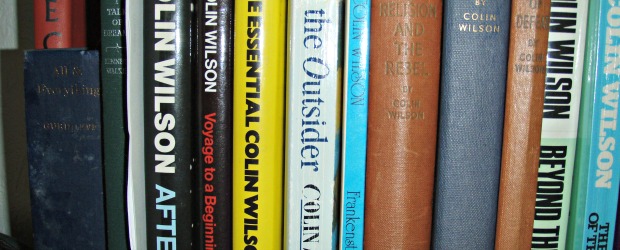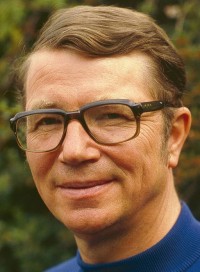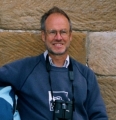You have no items in your cart. Want to get some nice things?
Go shopping
Colin Wilson had the misfortune of dying on the same day as Nelson Mandela. Quite probably even if he’d died at a different time he would still have had scant attention from the literary world. The Independent was one of the few quality papers to publish a generous obituary. Why has he been neglected and often ridiculed by critics? He certainly didn’t help his reputation by repeatedly claiming to be a genius. Nor did his gullibility or his lack of training in critical thinking help. However, for all his faults he was a one man writing-wizard; a true self-taught original; an enthusiast (en-theos = the god within, from the Greek). I defy anyone to read The Outsider or his biographical books- for example about Gurdjieff – without feeling exhilarated.
There has been a great deal of snobbery and clannishness exhibited among the intelligentsia when writing about him. I’ll come clean and say that he probably won’t have any lasting legacy in literary terms but I think he could well be a somewhat unlikely role model for aspiring writers. It must be realised that he was a communicator of ideas first and foremost. He had more in common with spiritual teachers in this respect than with literary figures.
I’d like therefore to focus on how his life and writing could inspire would-be writers.
First off, an insatiable curiosity about life, self-belief, perseverance and stamina are the obvious qualities he exemplified from the beginning and throughout his life. For years he had to put up with long boring hours working at menial jobs and lodging in sordid bed-sits. Sleeping on Hampstead Heath in a sleeping bag to save money is part of the legend but nonetheless underlines his single-mindedness during those early years. He constantly wrote while living under these conditions.
His first book The Outsider (1956) was a best seller and hailed as brilliant by all and sundry. The backlash quickly followed with his next book Religion and the Rebel. His first novel Ritual in the Dark also got the same treatment. All three books are intensely readable and in my opinion cannot be considered lightly. I re-read the first chapter of Ritual recently and thought it comparable to other admired novels of the period in quality.
Retreating to Cornwall to avoid adverse publicity he continued to doggedly write, getting up well before 6 am each day and putting in long hours of reading and writing. He published regularly, mostly ignored by the literary crowd. Oddly enough the publication of The Occult (unfortunate title) in 1971 brought some recognition and positive reviews. He forged a philosophy he termed The New Existentialism which most critics sneered at. Interestingly, these ideas have been discussed seriously in the magazine Philosophy Now. Perhaps this goes to show that among his often extravagant ideas were nuggets of insight and original thinking.
What do all his non-fiction books have in common? Firstly, he was a voracious reader and although he often takes information at face value and he selects to prove a point usually, the ideas tumble forth and the reader is carried along on an invigorating journey – as someone said, he could make the contents of a telephone directory sound exciting. Above all he almost makes it inevitable that you follow up his references, such is his enthusiasm.

Colin Wilson wrote one book which is especially relevant to aspiring writers; The Craft of the Novel, (1975). He discusses world literature in this book and as a literary critic he is consistent. He judges literature on how much light it sheds on the human condition. Do the protagonists struggle with the big questions: Who am I? How can I live authentically? What is the purpose of my life? Also, is the work ultimately life-affirming? Consequently he downgrades writers who simply hold up a mirror to life. He applies this existential approach to aspiring writers. He says we must have a sense of purpose and a view of life beyond the conventional. Of course, his ‘big idea’ is that human beings are limited by a consciousness which tends to get trapped in the mundane; the routines of life. His whole opus is really about how to expand consciousness and awareness.
He observes that many writers on creative writing courses are technically accomplished but regard content as secondary. I don’t think he’s advocating a didactic or autobiographical approach to writing, just that we should have strong themes and a sound structure to our stories.
He thinks all good literature should induce a kind of ‘peak experience’ in the reader – that sense of well-being and freedom from self-centredness we all glimpse from time to time. Much of The Craft of the Novel is taken up with his analyses of novels and how successful they are in terms of ‘thought experiments’ providing answers to the ‘big questions.’
We can take what is useful from his approach. We don’t necessarily have to incorporate philosophical questions in our creative writing but on the other hand we shouldn’t be afraid of writing in order to understand ourselves better. In a creative writing group the person whose writing stands out is often someone who thinks differently, someone who is not limited by conventional attitudes or mores. We can be true to ourselves. We all know it’s tricky finding our individual voice; it’s natural to imitate writers we admire. Colin Wilson certainly believed in himself and ploughed a lonely furrow, ignoring fashions and critics alike.
It may be judicious for us to be more aware of literary fashions but at the same time take inspiration from Wilson’s single-mindedness. He never stopped writing until a stroke in the last years of his life prevented him. He wrote around 150 books of variable quality. He was no literary stylist but much of his fiction is engrossing and evocative and bursting with ideas. His non-fiction is usually thought-provoking, if not always intellectually sound. I think he’s at his best when discussing other authors; see for example Eagle and Earwig as well as The Craft of the Novel. His fantasy series, Spiderworld, should be better known. Readers who enjoy Tolkien and Philip Pullman would surely take to his unlikely imaginative world of intelligent giant spiders battling and cooperating with the teenage hero. He wrote the stories in response to a challenge from Roald Dahl to ‘write a book for children.’ In the series of four novels Wilson shows he is not merely a commentator on other writers, his creative imagination is given full sway.
His autobiography is titled Dreaming to Some Purpose, an apt description of the creative process. In Julia Cameron’s seminal book about creativity, The Artist’s Way, she talks about the necessity of allowing the unconscious to express itself:
Art is an act of tuning in and dropping down the well. It is as though all the stories, painting, music, performances in the world live just under the surface of our normal consciousness. Like an underground river, they flow through us as a stream of ideas that we can tap into. As artists, we drop down the well into the stream. . . Once you accept the idea that it is natural to create, you can begin to accept the second idea – that the creator will hand you whatever you need for the project. Be alert: there is a second voice, a higher harmonic. . . This voice frequently shows itself in synchronicity. You will hear the dialogue you need. . .You will have the experience of finding things – books, seminars, tossed out stuff – that happen to fit with what you are doing. Expect the universe to support your dream. It will.
The universe supported Colin Wilson’s dream. It can support ours if we allow it to.

About Eric Nicholson
Retired. Eric enjoys walking in the countryside and observing wildlife. The interconnectedness of all life is something he would like to be able to write well about. He belongs to a writing group and writes poetry, non-fiction and fiction. Has a blog which is a platform for his writing.


This is an excellent article, I read it a while ago – and again today – and thank you for pointing me in the direct of The Craft of the Novel, which has proven invaluable. I’ve always been very fond of Wilson’s work, and indeed, he is certainly an inspiration to any would-be writers.
Glad you liked Craft of the Novel. The Strength to Dream is worth reading too.